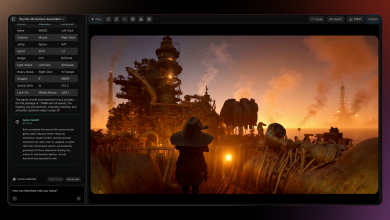
AI is at the forefront of transforming business operations in the UK, enhancing productivity, and fostering innovation. But as the nation stands on the brink of this technological revolution, business owners must adopt a balanced perspective toward AI implementation. It’s essential to acknowledge the irreplaceable value of human expertise in maximising the potential of AI.
At the heart of leveraging AI effectively is the recognition of its role as an enhancing tool rather than a substitute for human intelligence – AI isn’t a silver bullet for every business challenge.
As more and more businesses begin to integrate AI into their strategies, we will begin to see a clear divide between those who take a measured approach to implementation, and those who adopt AI purely for the sake of it.
Businesses that work to identify specific operational or strategic challenges that AI can address will set themselves up for success. Finding practical solutions and uncovering areas where AI can have a real impact is key.
By pinpointing where AI can deliver tangible benefits, companies can then pivot to fostering a culture of innovation as part of the strategy that embraces these advancements.
Fostering a culture of innovation
Once a business has identified where AI can have the best impact, the next step is to work closely with technology partners and AI experts.
This collaboration is crucial to demystifying the often-complex nature of AI technologies and understanding how they can be best applied within the context of the business. It’s about creating a dialogue that bridges the gap between technological possibilities and business realities.
To this end, business leaders need to foster a culture of continuous learning and adaptability within their organisations.
As AI evolves, so too must the skills and understanding of the workforce. Investing in education and training ensures that employees feel confident in working alongside AI. Investing in the upskilling of workers is ultimately the cornerstone for leveraging AI to enhance decision-making and strategic planning within an organisation.
Enhancing decision-making
The integration of AI into business analytics represents a pivotal shift in strategy and forecasting.
At the core of this transformation is AI’s capability to sift through vast datasets, identify patterns, and deliver actionable insights with a level of speed and accuracy far beyond human capabilities.
This capacity for deep data analysis and predictive analytics allows businesses to unlock a wealth of opportunities for optimisation and growth.
In the realm of supply chain management, for example, AI can predict disruptions, optimise logistics, and streamline operations, leading to significant cost savings and improved reliability.
By analysing data from various sources, including historical performance, market trends, and weather forecasts, AI-enabled algorithms can identify potential bottlenecks and suggest proactive measures to mitigate risks. This takes the likes of Enterprise Resource Planning (ERP) software in a company’s tech stack from a system of record to a system of action.
This level of insight and recommendations enables companies to make informed decisions that enhance efficiency and responsiveness in their supply chains, ultimately leading to a stronger competitive advantage.
Accelerating learning and development
Another key part of gaining a competitive advantage is making sure employees have access to high-quality learning and development pathways.
And while upskilling employees and training them to work with AI is essential, there’s also no understating the role that AI can play in education and training itself.
There’s huge potential to offer personalised learning experiences. AI can identify the unique strengths and weaknesses of each learner for example, allowing for the creation of customised learning paths that focus on areas needing improvement while reinforcing areas that excel further.
This level of customisation is achieved through sophisticated algorithms that analyse learners’ performance in real-time, adjusting the difficulty level and introducing new topics at the optimal pace for each person. As a result, learners are neither bored by material that is too easy nor overwhelmed by content that is too challenging.
By providing training that is both efficient and tailored to the needs of the workforce, businesses can more quickly adapt to new technologies and industry trends. This agility is essential for maintaining a competitive edge in the digital age.
Fusing human expertise with AI
As the UK navigates the challenges and opportunities presented by AI, the key to success lies in recognising the mutual relationship between human intelligence and artificial intelligence.
By harnessing the strengths of both, businesses can achieve unprecedented levels of efficiency, innovation, and customer satisfaction. The journey of AI implementation is not about choosing between humans and machines but about leveraging the best of both to create a more prosperous, sustainable future for all.




